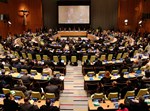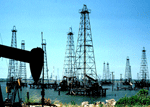Published on Fri, 2016-09-23 10:57
The 2030 Agenda is both a problem and a solution for the UN system. The UN, especially the UN development system, must be encouraged to return to its value-driven role in the public interest, grounded in the explicit adoption of norms and standards and delivered through programming that does not deviate from its core business. Otherwise it will find itself caught in a self-inflicted vicious circle of decline. “More of the same” will see the continuation of its shrinking role in global affairs at a time when so many challenges require international co-operation and resolve. |
Published on Fri, 2016-09-23 01:20
Unfortunately, whenever civil society and government strike discussions on human rights a certain unease sets in. The mood quickly dampens. On one hand, government mounts a defensive posture and on the other, civil society embarks on an offensive strategy. This gets worse when you throw in the word taxation. Like a spark to an inflammable concoction, you have the perfect recipe for an explosive discussion. |
Published on Fri, 2016-09-16 09:15
The 2030 Agenda and its 17 Sustainable Development Goals (SDGs) comprises a number of goals which concern the internal situation in Germany. Among these are goals which derive from the human rights obligations, such as in the areas of education, health and social security. Examples include reducing the proportion of poor people in Germany by half and increasing the proportion of young people who complete secondary education. Other goals address the external effects of German politics and economy. They demand domestic measures which also have immediate impacts for people in the countries of the South. These include goals for reducing resource use, for changing unsustainable consumption and production patterns, but also for the relationship to migrants and refugees. |
Published on Fri, 2016-09-16 09:10
In Azerbaijan reduced budget revenues and cuts in government spending are the result of the decline in crude oil prices, the main export of the country. The Social Watch coalition in Azerbaijan examines how these constraints can also hamper the financing of sustainable development initiatives. As crude oil prices have tumbled, a worsening of the country’s fiscal balance could gradually lead to an increase in the public debt burden and threaten fiscal sustainability in the long term. Azerbaijan’s sovereign wealth fund, SOFAZ, now has very limited profits from the sale of oil, and will contribute less to the fiscal revenues of the state as a consequence. The national state-owned oil-gas company, SOCAR, temporarily cancelled its plans for a new oil-gas refining and petrochemical complex because of the rapid fall in crude oil prices. However, at the same time, the new low oil price environment also offers an opportunity to boost a new wave of fiscal and public administration reforms in Azerbaijan. |
Published on Thu, 2016-09-15 14:43
The Fed Up campaign reached new heights last month when 120 community leaders and organizers from around the country sat down with ten of the Federal Reserve’s Presidents and Governors for an unprecedented on-the-record conversation about monetary policy and Fed governance in Jackson Hole, Wyoming. Workers and community leaders from mostly Black and Latino communities in all twelve of the Federal Reserve’s regional districts left their homes and families to travel to Jackson Hole to tell the Fed that the economy is still not working for their communities. They all belonged to the Fed Up campaign, a coalition of labor unions and community groups that came together two years ago to advocate for a more democratized Federal Reserve. |
SUSCRIBE TO OUR NEWSLETTER






